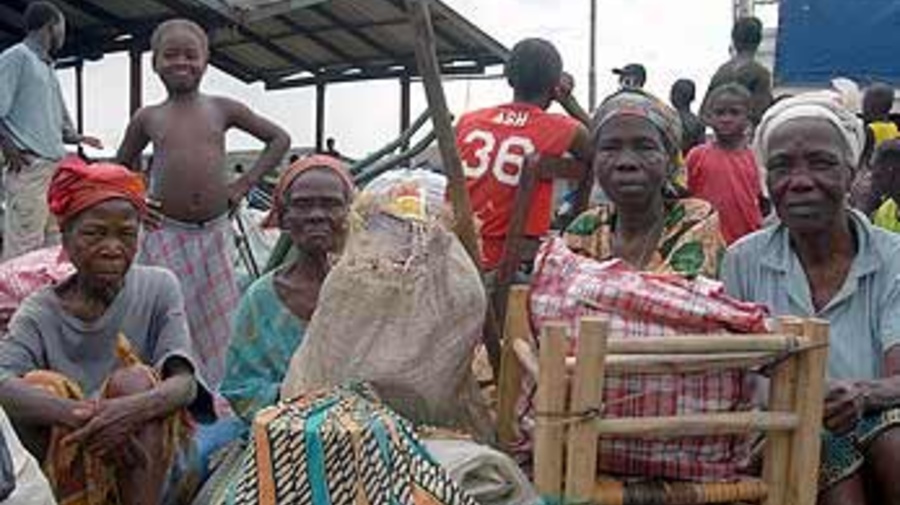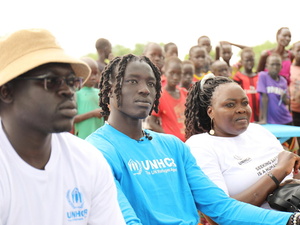IDP relocation on standby after security incidents in Liberia
IDP relocation on standby after security incidents in Liberia

Displaced Liberians getting ready to move from Harbel Multilateral High School to Unification IDP camp.
MONROVIA, Liberia, Dec 9 (UNHCR) - Recent security incidents in Liberia have led humanitarian agencies, including UNHCR, to temporarily reassess some operations in the country, including the relocation of displaced people near the capital, Monrovia.
Over the last two days, there have been reports of random shooting, banditry and looting of humanitarian supplies in various areas of Liberia, caused by former combatants dissatisfied with the terms of an ongoing disarmament programme.
The inter-agency programme, known as the Disarmament, Demobilisation, Rehabilitation and Reintegration (DDRR) process, was launched on Sunday. More than 2,000 former government soldiers turned up at Camp Schieffelin, a cantonment site 56 km east of Monrovia, to surrender their weapons.
However, some of the former combatants reacted strongly to the news that they would not receive their $150 allowance immediately as part of the disarmament and training package. Under the current plan, they are entitled to the stipend only after a three-week demobilisation training, followed by another $150 allowance three months later. They will also receive health care, counselling, vocational training, schooling and apprenticeships at the cantonment camps.
The shooting and looting incidents have caused the security situation to deteriorate in parts of Liberia. As a result, UNHCR has cancelled two missions to Zwedru in the east and Harper in the south. It is also waiting for the situation to improve before starting the next phase to relocate internally displaced persons (IDPs) from SKD complex outside Monrovia to IDP camps in the Montserrado area.
Last week, the refugee agency completed the transfer of some 1,630 displaced Liberians from public buildings in Margibi county, 35 km from Monrovia, to IDP camps around the capital in an attempt to provide better services to the displaced people and free up schools for the November school term.
"I really want to go back to my home, but right now I have to settle for a displaced camp," said 75-year-old Ma Bea Smallwood before leaving Harbel Multilateral High School for Unification IDP camp on Friday.
She had been living there for 10 months after fleeing rebel threats in her hometown of Buchanan. "My family was left behind and no one is actually looking after me, but I thank God for my life," she added.
For many of the relocating IDPs, the move means increased assistance and better living conditions. "It has been hell in these irregular shelters. We all anticipate a move for the better," said Aloysius Juahposhe, a teacher who has been displaced with his wife and two daughters since March.
In the IDP camps, UNHCR and other UN partners are working with the Liberian government and implementing partners to receive, register and distribute relief items to the new arrivals. Reception halls have been set up to provide temporary accommodation until the IDPs can finally settle into more private shelters in the camps.
The relocation is a first step to helping people rebuild their lives. Many of the displaced persons would prefer to return to their places of origin, noted Juahposhe, who expressed hope that the UN Mission in Liberia (UNMIL) would complete its deployment in the country as soon as possible so that people can go home.
Friday's move saw the highest number of displaced Liberians transported in a single day to an official camp since the relocation process began in early September in Monrovia. The exercise is an extension of an inter-agency initiative to help decongest Monrovia of some 30,000 IDPs crowded in schools and other public buildings.
The IDP relocation will continue after security improves across the whole of Liberia.









